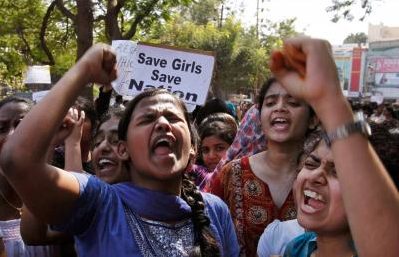Forty-seven per cent urban and 40 per cent rural adolescent girls feel unsafe in public transport, finds sample survey; more shocking facts on perception of girls’ safety in five Indian states
Forty-seven per cent urban and 40 per cent rural adolescent girls feel unsafe in public transport, according to a sample survey conducted by the NGO, Save the Children in six states of India – Delhi-NCR, West Bengal, Assam, Madhya Pradesh, Maharashtra and Telengana.
The worst fears of these adolescent girls were lewd comments, followed by stalking and staring, being hassled/jousted by men, including improper touch – in that order. It is also worrying that more than one in every four adolescent girls feared she could be abducted, physically assaulted or even raped while venturing into public space.
These facts, compiled in the report, “Wings 2018: World of India’s Girls”, was released in Kolkata on Wednesday.
In West Bengal, 41 per cent of adolescent girls feel unsafe in narrow bylanes of their own neighbourhood or near their schools, 22 per cent feel unsafe in roads to the school, marketplaces, or ways to their private tuitions. Sixteen per cent feel unsafe in public transport, the sample study found.
In addition, the survey also looks at perceptions of adolescent boys and parents on the girls’ safety issue, which makes the report even more interesting and relevant in view of the growing crime rate against women in India.
The report shows that 53 per cent urban and 54 per cent rural boys feel streets are unsafe for girls, 29 per cent rural and 25 per cent urban boys feel public transport is unsafe for women. The other spaces considered unsafe by the boys include schools and colleges, cinema halls, shopping malls, public gatherings, markets and spaces for open defecation.
A large percentage of boys favoured adhering to stereotypes. Sixty-three to 66 per cent boys in rural and urban areas said a woman was responsible for cooking, washing and taking care of the family. While some felt the attitude of society was not fair towards girls, they still thought girls were weak and needed protection from a male. They also felt that a woman’s clothes had a major role to play – and that girls should “dress appropriately while accessing public spaces.
“Some of the boys felt that a girl’s choice of attire has no relation to her safety. But when probed further, it emerged that they would not allow their own sisters to wear tight or short dresses in public spaces,” the report says.
Another aspect of the study was parents, and the findings were shocking, though not entirely unexpected. Thirty-five per cent of the parents from urban areas and 39 per cent from rural areas felt that “girls were taking away jobs from boys; and 24 per cent urban parents and 27 per cent rural parents felt that girls do not need to work as they would be looked after by someone after their marriage”.
Two out of five parents felt it is more important to allow boys to get a good education since they have to eventually earn and support the family. Almost two out of five parents were unhappy that the government is doing more to promote girls’ rights rather than creating jobs for boys.
Two out of five parents – both in rural and urban areas – feel there is “an active role of girls in some of the harassment cases”. “Thirty-three per cent urban and 25 per cent rural parents felt that the background of the woman involved should be checked to ascertain her ‘character’.”
Mothers were found to be more biased and regressive than fathers in this. Two out of five mothers believed that “incidents of harassment can be avoided if girls or women do not provoke boys/men”. “These mothers also felt that those with ‘loose moral character’ have higher chances of being raped.”
The total urban sample is from 30 cities of varying size and the rural sample was in 84 villages of 12 districts. There were 5,359 respondents comprising 3,128 adolescent girls (aged 11 to 18 years), 1,141 boys (15-18 years), 248 young, married girls (19-22 years) who had been married early and 842 parents of adolescent girls.
Chittapriyo Sadhu, general manager-state programme, West Bengal & Assam of Save the Children, said, “We should delve deeper into the problems, work together as policy makers, administrators, law enforcement agencies, family members, teachers… to address the deep rooted cultural and social norms that put our children at risk.”
(Cover photograph representational)

